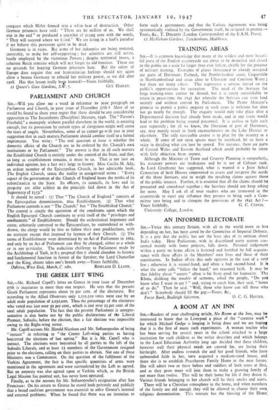PARLIAMENT AND CHURCH
Sut,—Will you allow me a word in reference to your paragraph on Parliament and Church, in your issue of December 27th ? Most of us would be found to share your regret that there should be any considerable opposition to The Incumbents (Discipline) Measure, 1946. The " Parson's Freehold," a monopoly without parallel elsewhere in the world, is amazing enough, but its possession by certain types of clergymen might well cause the tears of angels. Nevertheless, some of us 'cannot go with you in your suggestion that in such matters Parliament should confine itself to a formal imprimatur. You write: " The real question at issue is whether the domestic affairs of the Church are to be ordered by .the Church's own institutions or by Parliament." The answer is that in all such matters the Established Church is entirely under the control of the State, and that, so long as establishment remains, it must be so. That is not just an individual opinion, but a fact writ large in history. Miss Cecilia M. Ady, an ardent member of the Episcopalian Church, in her admirable book, The English Church, states the reality in unequivocal terms : " Every aspect of the government of the Church of England bears the marks of its subordination to the State. Its officers, its councils, its laws and its property are alike subject to the principle laid down in the Act of Supremacy of 1559."
It should be noted : (1) That " The Church of England " consists of the Episcopalian denomination, plus Establishment. (2) That what Parliament controls is not " The Church," but " The Established Church." The control is simply the operation of the conditions upon which the English EpiScopal Church continues to avail itself of the " privileges and emoluments " of Establishment. Should the ecclesiastical hegemony and estate, arbitrarily conveyed to the Episcopalians, be surrendered or with- drawn, the clergy would be free to follow their own predilections, with no restraint except that imposed by laymen of their Church. (3) The terms of Establishment were determined by an Act of Parliament in 1662, and only by an Act of Parliament can they be changed, either as a whole or in any particular. The audacious challenge to Parliament made by the Archbishop of York, in his proposal that it should abandon its historic and fundamental function in favour of the Speaker, the Lord Chancellor and the King, almost takes one's breath away.—Yours faithfully,


































 Previous page
Previous page